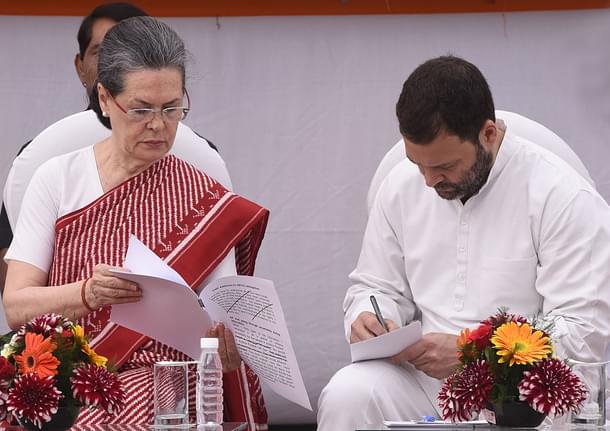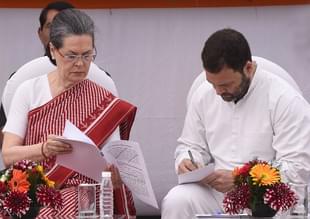Politics
Rahul’s Success Depends On Making A Break With Sonia’s Overt Minorityism
R Jagannathan
Dec 20, 2017, 03:21 PM | Updated 03:21 PM IST
Save & read from anywhere!
Bookmark stories for easy access on any device or the Swarajya app.


Rahul Gandhi’s good showing in Gujarat, where he picked the right issues to attack the Bharatiya Janata Party (BJP) with and forged new alliances with some caste-based outfits, is suggestive of a new beginning for the Congress party. However, while it is fine to focus largely on the government’s economic failures to rebuild the Congress’ narrative of inclusive development, he will not make a big dent unless he makes a clear break from his mother’s divisiveness.
It is fashionable to call Narendra Modi a divisive figure in Indian politics, but that is a Lutyens elite position. The truly divisive figure in Indian politics could well be Sonia Gandhi, and not merely for her Italian origins. The reality is that there has been a subliminal preference for minorityism under her leadership, and this perception has stuck with the majority community. It was under her tutelage that former prime minister Manmohan Singh made his infamous speech in 2006, where he clearly said that minorities “must have the first claim on resources.” It was under her stewardship that the government set up a Muslim-dominated panel, the Sachar Committee, to look into the economic plight of the minorities. No woman was included in this committee, even though the community had several gender injustices to contend with, including “triple talaq”. The community did not consider the possibility that its backwardness may be the result of regressive elements inside it – elements promoted by the Congress.
It was under her leadership that the most powerful chief minister in the country was Christian Y S Rajasekhara Reddy, whose government once tried to take over five of the seven hills, which house the Tirumala Tirupati Devasthanams (RRD), India’s richest Hindu temple.
While Sonia Gandhi did not ever make overly anti-Hindu comments – not surprising, given her own religious background in a Hindu majority country – but her biases emerged as an aggressive and personal hatred for Narendra Modi. Thus, Modi was nothing less than a “maut ka saudagar”, and she did little to lobby with the US to ensure that it did not deny a democratically-elected chief minister a visa to visit that country. Nor, for example, did she ever say anything about aggressive religious conversions, a big issue with many Hindus. Nobody asked her to ban conversions, but the fact that she had nothing to say on the issue speaks for itself.
In his early years, Rahul Gandhi took his political lessons from Sonia Gandhi’s biases, as evident in the statement he made to the US ambassador in 2009, that “bigger threat (to India) may be the growth of radicalised Hindu groups, which create religious tensions and political confrontations with the Muslim community”.
More recently, after the Modi government announced surgical strikes against terror camps inside Pakistan-occupied Kashmir after the jihadi attacks on an Indian Army camp in Uri, he referred to the BJP’s claims as “khoon ki dalali”, a statement reminiscent of his mother’s “maut ka saudagar”.
Rahul temple-hopping spree in the run-up to the Gujarat elections, his claim that he is a janeu-dhari Hindu and a Shiv-bhakt, should thus be seen as efforts by the dynasty scion to emerge from Sonia’s minorityism – and this has paid off in spades. The former claim (on his wearing a sacred thread) was made by one of the party spokesmen, but the latter one came directly from Rahul Gandhi.
This is typical Sonia-speak. Get others to say something that you do not want to formally claim yourself. It is worth recalling that Sonia Gandhi has never made references to her religious identity. In fact, even when she visited temples, the visits were kept under wraps and meant for local political consumption only.
In the early days of her takeover of the Congress, the party – in order to cover her Christian origins – made a bold statement that “Hinduism is the most effective guarantor of secularism in India.” She didn’t say it, and it was her party that did so.
In fact, most of her views on religion tend to come from people who seemed to talk on her behalf, but she herself never clarified anything, preferring to retain ambiguity. Thus, when rumours about Sonia Gandhi being a practising Christian swirled around the new Congress president in 1998-99, former Lok Sabha speaker P A Sangma went around saying that “Sonia Gandhi is not a practising Christian, and does not go to church.”
One wonders why this statement even needed to be made, unless it was meant to ensure that her leadership of the Congress was not challenged. The ruse did not work, for her leadership was challenged by Sharad Pawar, who left the party to start the rival Nationalist Congress Party, and Mulayam Singh Yadav, leader of the Samajwadi Party, spiked her plans to become prime minister in 1999 when he refused to give her a letter of support to form the government after the Atal Behari Vajpayee government fell. The late Tamil Nadu chief minister, J Jayalalithaa, made her foreign origins an election issue in the 2009 Lok Sabha elections – but didn’t gain traction.
The message for Rahul Gandhi is simple: if he has, by osmosis, imbibed any of Sonia Gandhi’s ambivalent attitudes towards the majority community, he is ultimately not going to make a dent in the BJP’s popularity. The BJP exists only because it has an in-born claim to represent the Hindu, even if it has done little to address their genuine grievances.
In short, he cannot hope to dethrone the BJP from its Hindu positioning unless he drops Sonia Gandhi’s own positions on them. He has to remember that the Congress party’s long-term domination of politics was built on two legs: an innate sanction from the Hindu majority, and a promise to protect the minorities. Under Sonia Gandhi, the first part of the agenda disappeared from view.
Rahul Gandhi cannot rescue his party unless he formally abandons Sonia Gandhi’s policies of appeasing the minorities.
Soon after the party’s huge defeat in 2014, veteran A K Antony admitted that the “party is inclined to certain communities or organisations. Congress policy is equal justice to everyone. But people have a doubt whether that policy is being implemented or not. This doubt is created by the party’s proximity towards minority communities, and such a situation would open the door for the entry of communal forces into Kerala.”
Antony’s statement can aptly be applied to Sonia Gandhi’s policies between 2004-14. Rahul Gandhi has to make a clean break from this bias.
Jagannathan is former Editorial Director, Swarajya. He tweets at @TheJaggi.





